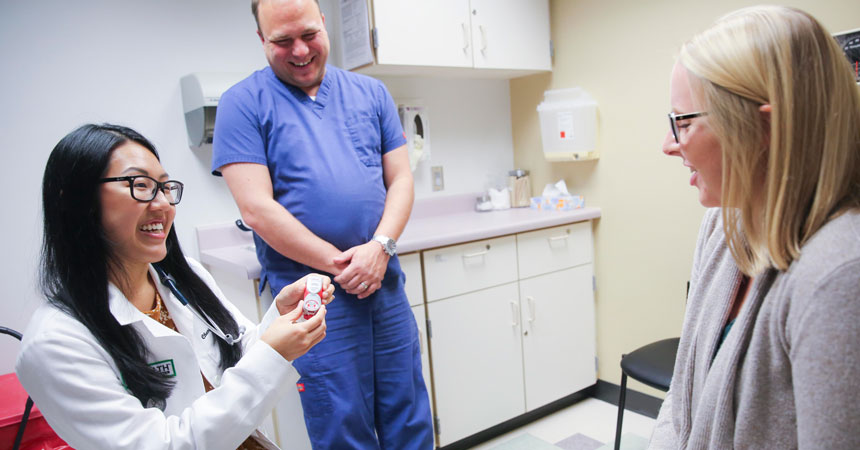Pharmacists provide patient value in team-based care
By Jan Jarvis
With inhaler in hand, Dr. Cheng Yuet went over every detail to make sure the patient understood how the drug would control their COPD symptoms.
“Use it every day, whether you feel like you need it or not,” she urged.
Dr. Yuet is proving what a difference it makes when pharmacists are integrated into the health care team. As part of an innovative model being used at UNT Health Science Center, Dr. Yuet and three other pharmacists manage the care of patients with chronic diseases such as asthma, diabetes and hypertension.
“Our scope is pretty broad, which is unique in pharmacy,” Dr. Yuet said. “As part of the health care team, our pharmacists can prescribe, change and refill medications; order laboratory tests; and schedule in-person or telephone visits for chronic disease state management.”
Many patients are unfamiliar with seeing a pharmacist in this role, Dr. Yuet said.
“It is important for patients to have awareness of how a pharmacist could help them reach their treatment goals alongside their physician or advanced practice nursing providers,” she said.
The model has been shown to improve outcomes for patients whose chronic diseases make care complex. Patients who are referred to pharmacist visits might take more than a dozen medications daily. Success has also been realized in terms of quality, collaboration and financial sustainability.
The Pharmacist-Led Chronic Care Management Services model being used at UNTHSC is featured in the September issue of the Annals of Family Medicine, said Dr. Yuet, the corresponding author of the article.
The approach also has won recognition from the Texas Society of Health-System Pharmacists, which presented the Innovative Collaborative Practice Award to the UNT Health Clinical Practice Group in April.
The service is believed to be the most expansive collaborative agreement in the state. The broad scope allows pharmacists to provide comprehensive medication management to virtually any patient in the practice independently.
Chronic diseases, like diabetes, pose a significant challenge for both the patient and the physician, said Randy Martin, PharmD, Associate Professor of Pharmacotherapy.
“Patients find themselves keeping track of multiple medications and seeing an array of providers,” he said. “For physicians, there’s a lot going on with these patients. This is where pharmacist-led chronic care management comes in.”
As the medication expert, the pharmacist can streamline the patient’s medication regimen, order labs, and provide important education on medications and lifestyle modifications.
Four pharmacists and 48 physicians work in collaboration to provide primary and specialty care at UNTHSC clinics.
The model demonstrates a revenue-generating, quality-focused approach that also helps to reduce costs at the institution, Dr. Yuet said. It was designed to generate revenue for the practice and offset the cost to incorporate a clinical pharmacist into the interprofessional health care team.
The approach benefits patients and health care.
“When we integrated pharmacists into the practice two years ago, we were passionate about giving patients access to a pharmacist in the clinic in a sustainable way,” Dr. Martin said. “Chronic care management enhances patients’ access to health care in a way that is complementary to their in-clinic visits.”







Social media